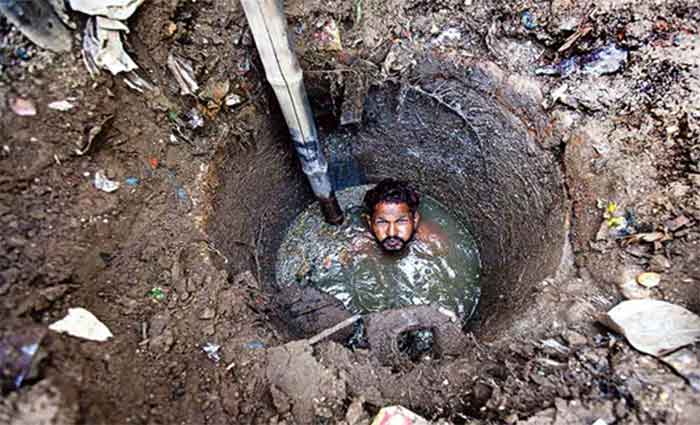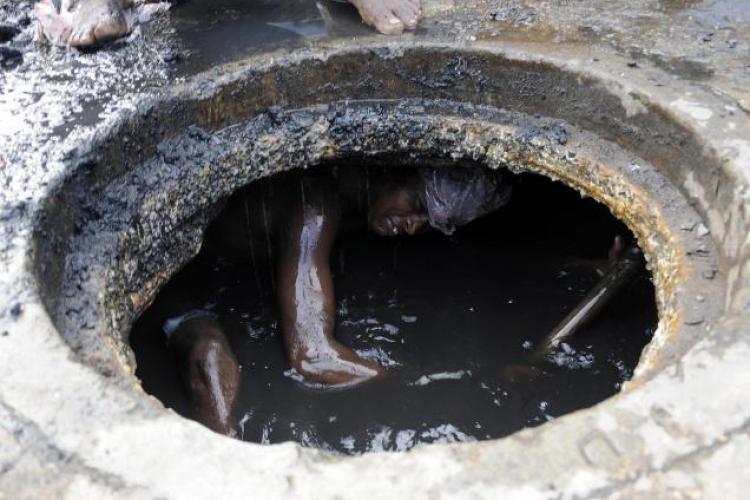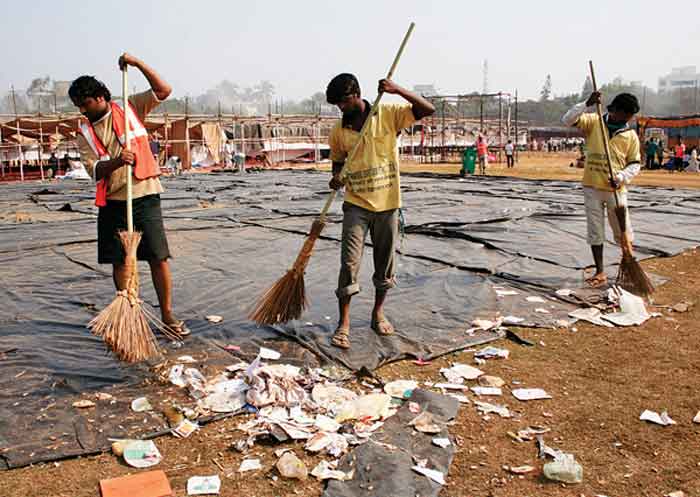
One of modern India’s great shames is the official failure to eradicate manual scavenging, the most degrading surviving practice of untouchability in the country.
– Harsh Mandar, Human Rights Activist
Consistent with caste-based custom and centuries-old feudal practices in the country, ‘manual scavengers’ coddle in the practice of manually cleaning excrement from public and private toilets and drains on a regular basis. For a few thousand rupees, people from a community called Valmiki, considered to be amongst the lowest sub-castes among Dalits, plunge to unblock manholes without proper equipment or masks. This sight has become so routine for everyone that it goes by unnoticed.
It is estimated that there are over 48,000 people engaged in manual scavenging in 2020, with women forming more than 98 per cent of the community. The average life expectancy of the group has been seen to be less than fifty years, with 80 per cent of them not even reaching the age of retirement. ‘On-the-job’ deaths in sewers, along with illnesses due to continued exposure to toxic waste and excreta, are the biggest factors behind these shocking figures. Even though there is no consensus on the number of deaths in sewers, it has been assessed that over 1,080 sanitation workers have lost their lives due to their inhuman treatment and lack of recognition as a community with basic human rights.
The central government, since Independence, has adopted policy and legislative efforts to end this practice. However, despite stringent provisions in modern law, this practice continues unabated throughout the country. This is despite the fact that the 1993 law banned the practice in India and the amended law in 2013 provides for punishment for engaging people for hazardous cleaning of septic tanks and sewers. This year, in another attempt to safeguard basic human rights for manual scavengers, the government has proposed the Prohibition of Employment as Manual Scavengers and their Rehabilitation (Amendment) Bill, 2020 as an amendment to the 2013 act, which failed miserably at a policy and implementation level. The act aims to provide rehabilitation of workers in this industry, compensate for sewer deaths, and secure protective equipment for the workers.
At first glance, the proposed Bill looks to be promising. It attempts to make the law banning the practice more stringent through a better faecal sludge management system as well as by increasing the fine amount and the imprisonment term. It aims to mechanize sewer cleaning completely while providing better protection gear at work. It proposes to address the problem of non-sewered areas while modernizing existing sewage systems and setting up sanitation response units with helplines.
However, once we take a closer look at it, we clearly see that the Bill fails to adequately address the safety of the sanitation workers as sewer deaths are the only issue covered under its ambit. More importantly, the Bill is silent on the core issue of ‘caste’. To date, sanitation remains a caste-based occupation, with generations of Valmikis being forced to follow the footsteps of the older generations. The Bill, however, fails to even question this historical injustice.
There is a need to redefine the categorization of manual scavengers. Currently, it only includes people involved in the ‘manual cleaning of human excreta’; however, larger sections of sludge handlers, toilet sanitation workers, and sewage treatment plant workers are excluded from this narrow definition. Additionally, only permanent employees are considered by the act for various rehabilitation and compensation benefits. Because of this, Indian Railways, which is the largest employer of manual scavengers in the country, can claim to be not involved in the practice as all its workers are hired on a contractual basis.
Another ironic development negatively impacting manual scavenging is the growth of the Swatch Bharat Abhiyan. With over INR 12,300 crore being allocated to the project in the current fiscal year, the rate of toilet construction has gone up exponentially. However, the entire mission fails to address one of the most important stakeholders, the sanitation workers. The mission provides for subsidies for the development of toilets but fails to provide appropriate focus on waste disposal, with no welfare measures for sanitation workers being included as part of the legislation under this mission.
As per Bezwada Wilson, co-founder and convener of the Safai Karmachari Andolan and a Ramon Magsaysay award winner, the mission has added to the exploitation, injuries, and even deaths of the manual scavengers. He believes that the success of the mission to completely remove open defecation should not be measured in terms of the number of toilets built but instead in terms of people still involved in the inhuman work of manual scavenging.
The current pandemic is an apt description of the state of affairs in the country. On the one hand, the government has applauded sanitation workers for all their work on the front lines in the midst of the spread of the virus to keep the cities clean, and on the other hand, these workers are not even offered adequate masks and protective equipment. They are left to fight two battles, all on their own: one with the toxic excreta and the other with a deadly virus.
The need of the hour is to stand up for the rights of this community. Just providing compensations for sewer deaths is far from adequate to help the manual scavengers. Guaranteed quality education along with alternate jobs is the bare minimum the government should commit to. Effective legislation is indeed required, but special implementation committees along with societal support are essential. True hope lies in NGOs and activist groups who are committed and willing to take a stand. There is also a need for capital investment focused on developing the requisite technology and infrastructure that eliminates the need for manual scavenging altogether. Multiple studies and evidence from developed countries show that technology to fully automate the cleaning of sewers and hazardous waste is available and can be implemented all across the country.
Devansh Anand is a second-year management student at IIM Ahmedabad. He hopes to live in a more equitable society someday while standing up for issues that help reduce the large prevalent divergences.
SIGN UP FOR COUNTERCURRENTS DAILY NEWSLETTER














































